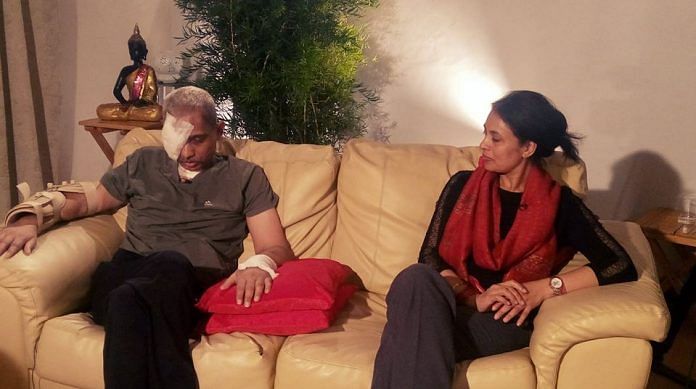The commandant who took nine bullets in an encounter and lived to tell the tale says 70 per cent of Kashmiris are pro-India and that it is possible to win the hearts of Kashmiris.
“A day before he was hit, he told me that there is a big operation (in the pipeline),” recalls Uma Singh, wife of Central Reserve Police Force (CRPF) commandant Chetan Kumar Cheetah, who was shot more than nine times in a bloody encounter with militants on 14 February. “But I said ‘let’s not talk about it’,” explaining that it is not advisable to discuss operations over the phone. “The next day I was in Srinagar.”
As she makes her grievously wounded husband sit next to her on a cream coloured couch in their CRP quarter in the capital, a strikingly calm Uma dwells on the bond her family shares with Kashmir – a bond that raucous exchanges on prime time television can perhaps never really grasp.
Cheetah has been posted in Kashmir thrice, and each of his three promotions came in the state. Moreover, Chetan and Uma’s second child – six-year old Rene – was born in Srinagar. “I would love to be posted in Kashmir again,” Cheetah says with his head dropping with the weight of injuries. It has been less than a week since Cheetah has started speaking and as he settles down for an interview days after being discharged from the AIIMS trauma centre, he is still struggling to talk – his physical frailties standing in sharp contrast to a self-admittedly indomitable spirit. “Minus the injuries, I feel on top of the world,” he says.
But what can Cheetah tell us about that fateful day when he was critically wounded during a joint operation in the Hajin area of Bandipora district in North Kashmir? “Nothing,” he admits. “I do not understand much right now, I don’t remember (anything)… But slowly I will.” With injuries in his head, upper limbs, waist, pelvic region, both hands and right eye, and a trauma, which is at best indescribable, Cheetah’s memory of 14 February is understandably hazy.
Besides his love for Kashmir, it is also this compelling and unsettling curiosity which is pulling Cheetah back to the valley. While there are inquiries and investigation going on, he wants to know himself what exactly transpired. “I want to find out if it was a trap for us,” he says. As opposed to what one might think, ‘Cheetah’ is no title for the doughty officer. Cheetah, who belongs to the Meena community in Kota, Rajasthan, gets his unusual surname from the family gotra.
His wife smiles at her husband’s undying spirit. “He is always like this,” she says. One of the first things he asked for when he began to speak was his glass of whisky, she laughs. Little Rene agrees. “Papa is always cracking jokes,” she says shyly. That he suffered nine bullet injuries has been reported widely in the media. However, in actuality there were 16 bullets – seven of which were stopped by his bulletproof vest. “The bulletproof (vest) saved him,” says Uma.
But what about the Kashmiri people? Does Cheetah share similar propinquity with the people of the state he so loves? Yes, he begs, there is love for Kashmiris, and there are efforts routinely made to make them understand the situation, but they do not buy those narratives. “They see people in uniform as outsiders… as occupiers,” he admits despondently. At the same time, he also adds that 70 per cent of Kashmiris are pro-India and that there is hope.
“It is possible to win the hearts of Kashmiris,” Cheetah argues. The situation, he believes, is so murky because the separatists are exploiting it, while those in Pakistan are pumping money to create havoc in the valley. “Little children in the valley get paid for pelting stones,” adds Uma. Kashmiri women, he alleges, make wild allegations of harassment and manhandling by the forces, when there is none, he adds.
Amid this talk on the politics of beleaguered state and its people, Cheetah almost cathartically admits that while he is pleased at the recognition he is now getting. “What does a soldier want? Name and fame, a medal on his chest…” he pleads. “And acknowledgement,” adds Uma. Ten-fifteen days prior to this operation, he had killed another Lashkar-e-Taiba militant, she says with an unmissable smile.
Despite the family’s incredible spirit, however, a sense of both fear and relief is palpable in the quarter’s modestly decorated living room. “There is always a fear at the back of our minds… This time, my fear turned into reality,” says Uma. “I didn’t know what had exactly happened to him when I got the news… To be honest, I didn’t even try to find out.”
As the family continues to rejoice a recovery, which has been described as nothing short of a miracle by doctors themselves, the image of an infirm and bandaged Cheetah sitting by the side of his family, is both reassuring and chilling.




Salute !